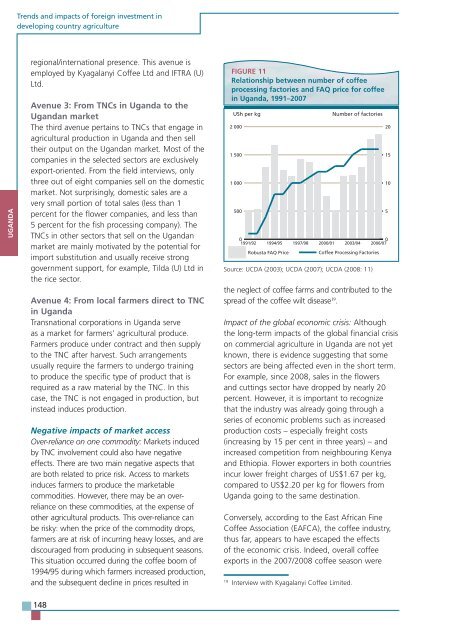TRENDS AND IMPACTS OF FOREIGN INVESTMENT IN DEVELOPING COUNTRY AGRICULTURE
TRENDS AND IMPACTS OF FOREIGN INVESTMENT IN DEVELOPING COUNTRY AGRICULTURE
TRENDS AND IMPACTS OF FOREIGN INVESTMENT IN DEVELOPING COUNTRY AGRICULTURE
You also want an ePaper? Increase the reach of your titles
YUMPU automatically turns print PDFs into web optimized ePapers that Google loves.
UG<strong>AND</strong>A<br />
Trends and impacts of foreign investment in<br />
developing country agriculture<br />
regional/international presence. This avenue is<br />
employed by Kyagalanyi Coffee Ltd and IFTRA (U)<br />
Ltd.<br />
Avenue 3: From TNCs in Uganda to the<br />
Ugandan market<br />
The third avenue pertains to TNCs that engage in<br />
agricultural production in Uganda and then sell<br />
their output on the Ugandan market. Most of the<br />
companies in the selected sectors are exclusively<br />
export-oriented. From the field interviews, only<br />
three out of eight companies sell on the domestic<br />
market. Not surprisingly, domestic sales are a<br />
very small portion of total sales (less than 1<br />
percent for the flower companies, and less than<br />
5 percent for the fish processing company). The<br />
TNCs in other sectors that sell on the Ugandan<br />
market are mainly motivated by the potential for<br />
import substitution and usually receive strong<br />
government support, for example, Tilda (U) Ltd in<br />
the rice sector.<br />
Avenue 4: From local farmers direct to TNC<br />
in Uganda<br />
Transnational corporations in Uganda serve<br />
as a market for farmers’ agricultural produce.<br />
Farmers produce under contract and then supply<br />
to the TNC after harvest. Such arrangements<br />
usually require the farmers to undergo training<br />
to produce the specific type of product that is<br />
required as a raw material by the TNC. In this<br />
case, the TNC is not engaged in production, but<br />
instead induces production.<br />
Negative impacts of market access<br />
Over-reliance on one commodity: Markets induced<br />
by TNC involvement could also have negative<br />
effects. There are two main negative aspects that<br />
are both related to price risk. Access to markets<br />
induces farmers to produce the marketable<br />
commodities. However, there may be an overreliance<br />
on these commodities, at the expense of<br />
other agricultural products. This over-reliance can<br />
be risky: when the price of the commodity drops,<br />
farmers are at risk of incurring heavy losses, and are<br />
discouraged from producing in subsequent seasons.<br />
This situation occurred during the coffee boom of<br />
1994/95 during which farmers increased production,<br />
and the subsequent decline in prices resulted in<br />
148<br />
FIGURE 11<br />
Relationship between number of coffee<br />
processing factories and FAQ price for coffee<br />
in Uganda, 1991–2007<br />
USh per kg Number of factories<br />
2 000<br />
1 500<br />
1 000<br />
500<br />
0<br />
1991/92<br />
1994/95<br />
1997/98<br />
2000/01<br />
Robusta FAQ Price Coffee Processing Factories<br />
Source: UCDA (2003); UCDA (2007); UCDA (2008: 11)<br />
the neglect of coffee farms and contributed to the<br />
spread of the coffee wilt disease 19 .<br />
Impact of the global economic crisis: Although<br />
the long-term impacts of the global financial crisis<br />
on commercial agriculture in Uganda are not yet<br />
known, there is evidence suggesting that some<br />
sectors are being affected even in the short term.<br />
For example, since 2008, sales in the flowers<br />
and cuttings sector have dropped by nearly 20<br />
percent. However, it is important to recognize<br />
that the industry was already going through a<br />
series of economic problems such as increased<br />
production costs – especially freight costs<br />
(increasing by 15 per cent in three years) – and<br />
increased competition from neighbouring Kenya<br />
and Ethiopia. Flower exporters in both countries<br />
incur lower freight charges of US$1.67 per kg,<br />
compared to US$2.20 per kg for flowers from<br />
Uganda going to the same destination.<br />
Conversely, according to the East African Fine<br />
Coffee Association (EAFCA), the coffee industry,<br />
thus far, appears to have escaped the effects<br />
of the economic crisis. Indeed, overall coffee<br />
exports in the 2007/2008 coffee season were<br />
19 Interview with Kyagalanyi Coffee Limited.<br />
2003/04<br />
20<br />
15<br />
10<br />
5<br />
0<br />
2006/07


